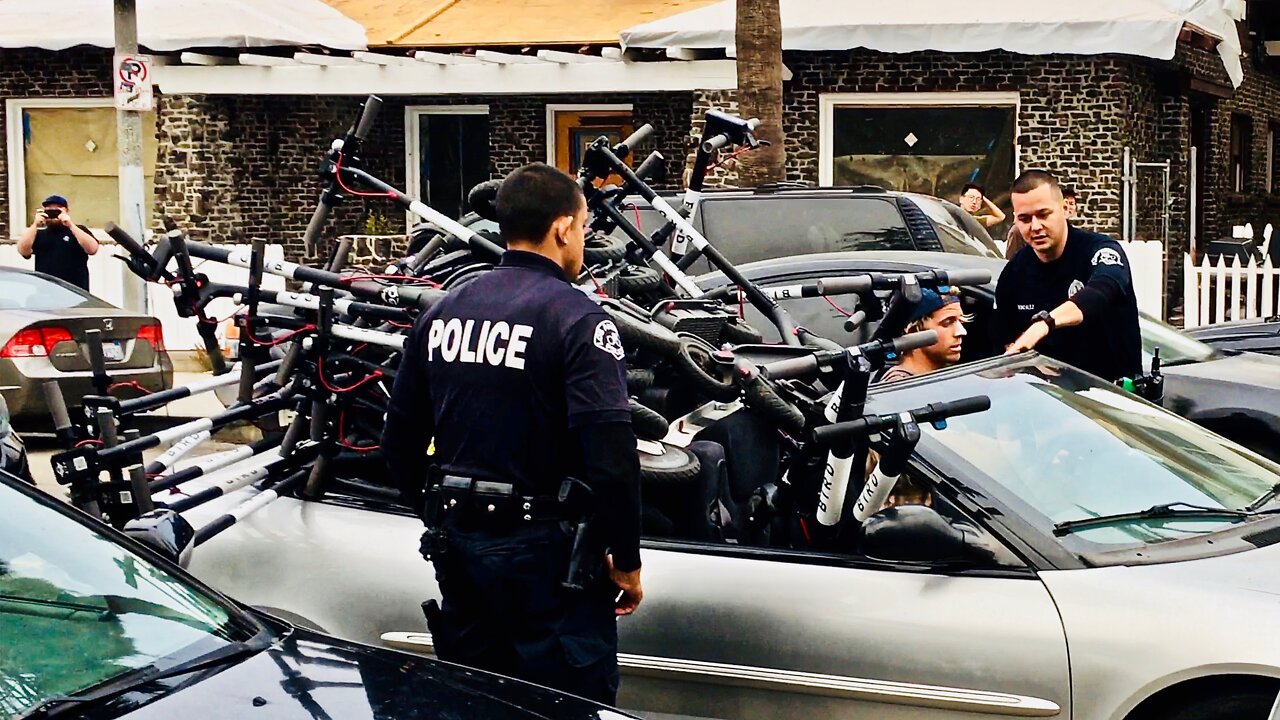Premium Only Content

Electric Scooter Bandit Nabbed by Venice Beach Police
Too Many Birds - Police Catch Bird Scooter Catcher - Venice Beach- Bird is a scooter-sharing company that launched in 2017 and has been dubbed the “Uber of scooters.” Its goal is to alleviate congestion and allow people an easy way to travel quickly for short distances of just a few miles. Riders can locate and unlock scooters using the company’s smartphone app, and after paying the $1 unlocking fee are charged 15 cents per minute during use.
Birds are available in a growing number of American cities including Austin, Texas; Nashville, Tennessee; Los Angeles; San Francisco; Scottsdale, Arizona; Washington D.C.; and Atlanta. The scooters are all battery-powered and dockless, so they can be picked up or dropped off anywhere.
But when night falls, what most riders don’t realize is that the scooters themselves are charged by a contract workforce. These people are known as “Bird hunters” or “chargers,” and they’re growing exponentially in number.
Registering to become a charger isn’t hard. Unlike Uber or most ride-sharing services, Bird doesn’t require a background check or any kind of complicated registration procedure. It takes a few simple steps including registering your address and providing personal information, tax information, and bank-account information so you can get paid via direct deposit. If your application is approved, within a matter of days Bird will mail you three charging packs to get started. Charging a Bird doesn’t require a ton of electricity, so minus the labor cost, charging a few scooters overnight is essentially free—especially if you live in a large apartment building and can do so in your bike room.
As Birds and comparable scooter-sharing services continue to expand, charging has become a popular way for high-schoolers, college students, and young professionals to earn easy money.
“Charging scooters for Bird is like Pokémon Go, but when you get paid for finding Pokémon,” says Nick Abouzeid, a 21-year-old charger in San Francisco. Several nights a week after work, he and his girlfriend go on walks around the city, collecting scooters and bringing them back to his apartment building to charge in the basement.
“It’s really fun to grab a few scooters, charge them, and in the end it pays for a fancy dinner,” Abouzeid says. “It’s like a game and I would do it even if the prices were halved, which they probably will be.”
Like Pokémon Go, when you enter “charger mode” the Bird app displays a real-time map of Birds across your area that require charging. The reward for capturing and charging these Birds can range from $5 to $20 depending on how difficult the Bird is to locate—and some can be really hard to find. Bird chargers have described finding Birds in and under trash cans, down the side of a canyon, hidden in bushes, or tossed sideways on the side of the street.
“Finding the really hard ones is so awesome,” says Lucas, a young teenage Bird charger in L.A. who didn’t want his last name or his age listed since he technically hunts under his parents’ account. “It’s become a big trend at my high school. People are like, ‘Oh are you gonna charge tonight?’ I have friends send me Snapchats like, ‘I just got 18 in one night!’ or, ‘Look where I found this one.’ There’s definitely a sense of achievement in picking a lot of them up.”
“I think so many teens are doing it because it’s a really easy way to make a lot of money on the side,” says Brandon. “Everyone loves Bird so when you tell people you’re a Bird charger they’re like, ‘Whoa! That’s cool, how do I do that?’ No one thinks it’s lame. My friends and I are pretty much in the tech crew [at school], so we found out sooner. But now popular kids are asking how they can sign up and get Birds.”
Lucas says he goes out with friends nearly every night, and even when they don’t find tons of Birds, it’s still a fun, social activity. “It’s like a whole-city scavenger hunt,” he says. He even jokes that it would make a great date.
But while Bird hunting is fun and games for some, other chargers take the job much more seriously. Charging in some cities, like San Diego, has become a cutthroat competition between workers where every last dollar counts.
Hoarding in particular has become a problem in these crowded markets. Bird and other companies will pay a $20 reward for missing scooters, so some chargers simply keep the scooters in their garage until they’re reported missing by riders or the bounty goes up to $20, then claim the finder’s fees. Bird theoretically polices this behavior, and Brandon says he’s gotten a warning call from the company for hoarding, but the bad behavior has become commonplace and punishment is unevenly enforced.
In saturated markets, the race to quickly grab as many scooters as possible is fierce. “One time I pulled up to pick up a scooter, I got there maybe 10 seconds before the other guy did,” said one charger in San Diego. “He started yelling at me. He picked up a Bird scooter and started beating my car. I got the hell out of there.”
-
 52:31
52:31
Knowledge Land
24 days agoMystery of the 3,000 Year Old Girl from Egtved Denmark - Life in the Bronze Age
731 -
 1:01:22
1:01:22
Anthony Pompliano
1 day ago $0.02 earnedTrump Inauguration Sends Bitcoin Flying
319 -
 15:21
15:21
LFA TV
7 hours agoWHY GOLD WILL CONTINUE TO SKYROCKET
459 -
 1:31:40
1:31:40
MTNTOUGH Fitness Lab
1 hour agoThe Power of Brotherhood: How Vulnerability and Grit Shape Resilient Men with Thosh Collins
3 -
 DVR
DVR
Redacted News
2 hours agoTRUMP JUST SENT PUTIN AN ULTIMATUM ON WAR, ZELENSKY PUSHES FOR U.S. BOOTS ON THE GROUND | Redacted
61.6K116 -
 1:02:19
1:02:19
In The Litter Box w/ Jewels & Catturd
22 hours agoStargate | In the Litter Box w/ Jewels & Catturd – Ep. 725 – 1/22/2025
78.5K31 -
 1:44:50
1:44:50
The Quartering
5 hours agoJ6 Hostage Release Delayed, ICE Raids Begin, Woke Pastor Vs Trump & Biden's Letter To Trump!
115K69 -
 LIVE
LIVE
Space Ice
5 hours agoSpace Ice & Redeye: Sylvester Stallone's Cobra With Critical Drinker
103 watching -
 11:59
11:59
Bearing
9 hours agoCRAZY TikTok Lady's Reaction to Donald Trump's Inauguration 🤣
4.63K21 -
 6:51
6:51
Chef Donny
5 hours agoMaking Omelets With Dave Portnoy | What's For Lunch
26.8K2